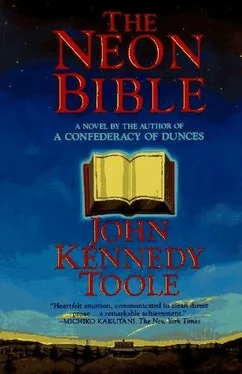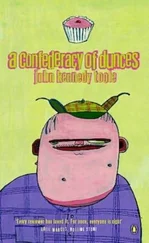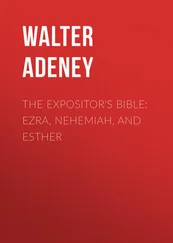As I wiped around her mouth, I looked at her. This wasn't Mother, all brown and dried out and covered with sticky blood. I ran my hand on her forehead like I used to when it was white and soft, but it was dry and hard and dark. She was breathing hard, and sometimes it sounded something like a sigh, a sort of choking sigh. The bed looked too big for her, so small and dry in the light that came through the door from the hall, the dim yellow light that made her look even worse.
Then I was crying, and I didn't want to. I had to think of what I was going to do with her here and Aunt Mae gone. My mother was dying. I knew it, and I couldn't do anything about it. The wind just blew cold and strong against the window in the room. It was the only other thing besides me and Mother up there on the hill. I held my hands up to my eyes like I was afraid somebody would see me and think I was too old to do it, and I cried like I never cried in my life, even when I was little. I couldn't stop, and I tried to catch my breath, but all of the things that had gone wrong came into my mind, and I put my head up against Mother on the bed and held her in my arms and cried on her hard chest like I did when it was full and round.
I felt her tremble. Something made me look up at her face, and her lips were moving. I tried to understand what she was saying, but they just moved for a while without making any sound, dry and cracked and with blood caked on them. The wind began blowing stronger and louder, so I got up closer to her face to hear, and she said, "Frank," and the breathing stopped, and she laid still in my arms.
All that night I stayed in the room where my train was. The wind howled and whistled and shook the house, and I was frightened. My mother was dead in the next room with a blanket over her. It was cold in the house, in the room where I was and in the next room too, but I guess it was colder in that room.
The night seemed like it would never get light again and like the wind would never stop. I sat down on the floor next to the rusty train and felt the wind blow in through the cracks in the wall and the openings around the window. My arms got full of little bumps, and I felt them on my legs too. I don't know why, but I kept thinking about Jo Lynne and the night in the new houses, and I wondered what she was doing now and where she was. But all the time I was still frightened and thinking about what I was going to do, too.
What would I do about burying Mother? I didn't know where I could write to Aunt Mae. She would tell me what to do, but I couldn't get her. And I thought about how much it cost to bury somebody. I didn't hardly have any money but what Mr. Williams gave me in the envelope, and that wouldn't do anything. If you didn't have the money to bury somebody, the state took care of them and buried them in some place in the capital without a name on the stone. Mother couldn't go there, and I couldn't wait a week to hear from Aunt Mae. You couldn't wait a week to bury somebody, either.
The light came up at last, first thin and pink, and then red and strong. I got up and went downstairs because I was hungry. There were some eggs in the kitchen, so I fried one and ate it, but I had let it in the pan too long, and it was brown on the bottom and tough. The yellow tasted creamy and good, but I had to chew the white a long time before it would break up and I could swallow it.
When the day was in full, I saw it was going to be an early winter day with a bright blue sky and a cold breeze blowing through the hills. The sun was out, so I put on my coat and went and sat on the back steps. I wanted to be out of the house so maybe I could think about what I was going to do, but my mind wouldn't settle on one thing. I thought about a whole lot of different things while I sat there, and I could only get one thing clear.
I got the shovel that Poppa bought when he started to plant the clearing. It was under the house, all rusty, and had spider webs on the handle, so I wiped it off with a piece of paper before I used it. Back in the clearing I couldn't decide where to start digging. There were a lot of places that looked good. I finally picked a place between two pretty pines where it was dark and the wind was combed out until it was just a slight breeze. The clay was soft, so it was easy to dig. The only trouble I had was with roots, but there weren't too many of them, and they broke off pretty clean when I hit them with the shovel blade. The breeze blew some needles and cones down into the hole, and some bush leaves. And it blew more things up against the pile of clay that was building up where I shoveled it. I hit some rocks too, but they weren't big ones, just little gray chips.
By the time I finished it was getting warmer, but the breeze was still up through the pines. I could see by the sun that it was just about noon. There weren't any shadows in the hole now except for the ones the pine branches above made, and the trunks didn't have any dark twin hanging behind them. The morning was over. I felt hungry again, so I went in the house and found another can in the kitchen. It was just tomatoes. I ate them out the can without heating them, and they needed salt.
It was colder in the house than it was outside. I had left the windows closed, and the cold air from the night was still all over everything. I would go upstairs in a little while, I thought, and get her, but I'd rather just sit in the kitchen now a while. Just as I was finishing a glass of water, I heard something moving around on the front porch, and the door opened. Aunt Mae kept Poppa's old gun in the kitchen in case somebody or some animal came around when she was there with Mother. I never knew why, because they didn't have any big enough animals in the hills and no people ever came up near the house, but I took the gun from behind the stove now, although I never had used one in my life.
By the footsteps in the hall I knew it was a man. Then he coughed and broke the still and cold of the house. I got the gun and put it by the kitchen door and went into the hall.
"Hello there, Robert."
It was the preacher.
"My name's David." I wondered what he was doing in the house.
"David. Pardon me. It's just so long since I've known your family at the church."
I didn't say anything, and when he saw I wasn't going to talk, he went on again.
"Well, I see your aunt has gone away, son, and I might as well get down to brass tacks, as the expression goes. I'm here on behalf of the state, son. Now, you know your mother needs a better place to stay, and you can't take care of her here by yourself. When your aunt was here it was different, but now with her gone. . ."
"What do you want?" I kept my eyes on him, but he was looking all over the place and never looked at me.
"Now, I have my car at the bottom of the hill, and I'm ready to take her off to a very nice place not far from here. You know where I'm talking about. She'll be happy there, son. This is no place for her to be with just a boy and all. Get a few of her clean dresses together, if you will. Now, is she upstairs? Go get her down here. I'll just sit in the front room and wait."
"She isn't going with you. She isn't here," I said as he started to walk to the old couch. He turned around.
"Now, son, maybe you don't understand. It's for your own good, and for the town too. As a Christian, I want to see that what's done is the best for all. I'll go up and get her myself."
He walked over to the stairs and started up, but I called to him.
"She's not up there. Anyway, you can't come in here like that. Get out of here. You hear me, get out of here. Get off those steps, damn you, before I come pull you off and get the sheriff. Get the hell out of this house, you bastard, I know what you. . ."
"I won't listen to any more of your profanity, boy. Keep your peace and be grateful that someone has enough interest to work for you and help you in the name of the Lord!"
Читать дальше












